|
|
|
Sort Order |
|
|
|
Items / Page
|
|
|
|
|
|
|
| Srl | Item |
| 1 |
ID:
111351
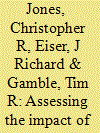

|
|
|
|
|
| Publication |
2012.
|
| Summary/Abstract |
In 2007 the UK government's public consultation on the future of nuclear power courted much criticism. Three studies were conducted to assess whether key arguments used by government within this consultation might have influenced public opinion about the technology. Participants first read a passage of text that made salient certain positive (climate change mitigation, increased energy security) or negative (nuclear waste) aspects of the nuclear debate. Participants then completed a task that required them to create an electricity mix for the UK by varying the contributions made by each of five energy sources (coal, gas, nuclear, renewables and electric import). Study 1 seemed to indicate that pitching the debate in terms of climate change mitigation was effective in increasing endorsement of nuclear power. The results of studies 2 and 3, however, contested this conclusion, suggesting that these arguments were having little direct impact upon participants' preferences for nuclear power. The results of these studies hold implications for UK energy policy and attitude assessment and can contribute to the understanding of how the arguments used by government in the 2007 consultation might have influenced public opinion.
|
|
|
|
|
|
|
|
|
|
|
|
|
|
|
|
| 2 |
ID:
125827


|
|
|
|
|
| Publication |
2013.
|
| Summary/Abstract |
A survey was conducted to study the attitudes of Hong Kong residents toward the safety of operations of the nuclear power plant in Daya Bay and their possible actions in case of leakage. Only 34.5% of the respondents were confident about the operational safety of the nuclear power plant, whereas 23% stated they would immediately leave Hong Kong when leakage occurs. Chi-square tests and multinomial logit analysis indicate that the degree of confidence is significantly related to the perceived ability of the Hong Kong (HK) government and the nuclear power plant company, China Light and Power Co. Ltd. (CLP), knowledge of emergency plan and responsibility, gender, and age. However, the degree of confidence is not significantly related to the distance of the residential area from the nuclear power plant. In addition, the higher the perceived ability of the HK Government and CLP to handle nuclear leakage, the greater the degree of confidence becomes. The chi-square tests suggest that higher perceived ability of the HK Government and CLP are also significantly associated with less likelihood of residents immediately leaving Hong Kong in case of leakage. Hence, the HK Government and CLP are recommended to improve their perceived ability for safety and social stability.
|
|
|
|
|
|
|
|
|
|
|
|
|
|
|
|
| 3 |
ID:
169730
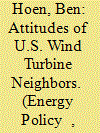

|
|
|
|
|
| Summary/Abstract |
Experts predict continuing deployment of wind turbines in the United States, which will create more interactions between turbines and surrounding communities. Policymakers can benefit from analyses of existing wind projects that enable them to better understand likely effects on residents around proposed projects. Our analysis of a randomly drawn, representative national survey of 1705 existing U.S. wind project neighbors provides previously unavailable detail about factors influencing the attitudes of these neighbors toward their local wind projects. Overall, we find positive-leaning attitudes, which improve over time as individuals self-select into communities near existing wind projects. Hearing wind turbines leads to less-positive attitudes, although living very near to turbines does not, nor does seeing wind turbines. In fact, our findings suggest complex relationships among nearby residents’ attitudes, their perceptions about the particular fit of turbines within their landscape and community, and their perceptions of wind project impacts on property values. These findings—along with the positive correlation between perceived planning-process fairness and attitude—suggest areas of focus for wind project development that may influence social outcomes and acceptance of wind energy. The concluding discussion provides a number of policy and future research recommendations based on the research.
|
|
|
|
|
|
|
|
|
|
|
|
|
|
|
|
| 4 |
ID:
183024


|
|
|
|
|
| Summary/Abstract |
In light of the recent terrorist attacks in Paris and Brussels, the aim of the current set of studies was to examine if attitudes towards terrorists and—by extension—uninvolved outgroups (i.e., Muslims, refugees, and immigrants) changed before vs. after these attacks. In a Belgian student sample (Study 1a), we investigated the impact of the Paris attacks on various facets of outgroup attitudes: feelings towards terrorists, Muslims, and refugees, immigrant trust, immigrant threat, and immigrant prejudice. The impact of the Brussels attacks was studied in a Belgian convenience sample (Study 1b), specifically focusing on feelings towards refugees, refugee trust, refugee threat, and avoidance of contact with refugees. Results from frequentist and Bayesian analyses in both samples revealed no significant short- and long-term longitudinal changes in outgroup attitudes after both the Paris (Study 1a) and Brussels (Study 1b) attacks. We discuss these findings and connect them to the alleged refugee crisis; another recent event that polarized European societies.
|
|
|
|
|
|
|
|
|
|
|
|
|
|
|
|
| 5 |
ID:
171493
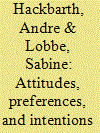

|
|
|
|
|
| Summary/Abstract |
Based on a survey among customers of seven German municipal utilities, we estimate two regression models to identify the most prospective customer segments and their preferences and motivations for participating in peer-to-peer (P2P) electricity trading and develop implications for decision-makers in the energy sector and policy-makers for this currently relatively unknown product. Our results show a large general openness of private households towards P2P electricity trading, which is also the main predictor of respondents' intention to participate. It is mainly influenced by individuals’ environmental attitude, technical interest, and independence aspiration. Respondents with the highest willingness to participate in P2P electricity trading are mainly motivated by the ability to share electricity, and to a lesser extent by economic reasons. They also have stronger preferences for innovative pricing schemes (service bundles, time-of-use tariffs). Differences between individuals can be observed depending on their current ownership (prosumers) or installation probability of a microgeneration unit (consumers, planners). Rather than current prosumers, especially planners willing to install microgeneration in the foreseeable future are considered to be the most promising target group for P2P electricity trading. Finally, our results indicate that P2P electricity trading could be a promising niche option in the German energy transition.
|
|
|
|
|
|
|
|
|
|
|
|
|
|
|
|
| 6 |
ID:
177345
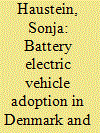

|
|
|
|
|
| Summary/Abstract |
Countries worldwide are trying to increase the share of battery electric vehicles (BEVs) to reach environmental goals. As part of these efforts, the EU project GREAT installed new fast chargers in Denmark and Sweden and provided possibilities to test BEVs and inform about them. To monitor changes in attitudes and behaviours and to estimate the impact of project activities, surveys with BEV and conventional car users were conducted in 2017, 2018, and 2019. We found that attitudes and driving behaviour of BEV users and non-users remained quite stable. While car users in Denmark and Sweden showed similar profiles, one exception was a more negative evaluation of and higher uncertainty about political support for BEVs by Danes. Modelling purchase intention, we found a significant effect of the new fast chargers in Denmark but not in Sweden, while the opposite was the case for information campaigns. Lifestyle compatibility and symbolic-affective attitudes were relevant for BEV adoption in both countries. For cross-border trips, the most relevant factor was whether people had a Tesla or not, reflecting the better driving range and fast charging infrastructure. An increase of charging infrastructure, clearer policy signals and symbolic-affective marketing are discussed as ways to increase BEV adoption.
|
|
|
|
|
|
|
|
|
|
|
|
|
|
|
|
| 7 |
ID:
121315


|
|
|
|
|
| Publication |
2013.
|
| Summary/Abstract |
Energy saving is now an important component of China's energy policy. This paper reports the findings of a survey carried out in 2009 and 2010 of 246 citizens at different locations in the municipality of Chongqing in order to reveal information about attitudes towards energy and energy saving in the context of household electrical appliances. This study shows that citizens in Chongqing receive relatively little information and guidance on how to save energy in the home and that their stated level of knowledge on this subject is also rather limited. Respondents showed some willingness to save energy as long as this did not reduce their comfort and convenience, and they appeared likely to respond to economic incentives, such as high electricity prices or discounts on appliances. But they seemed to be unaware of the potential for information to help them save energy. The survey also demonstrated a high degree of heterogeneity across society with respect to sources of information and trust in those sources and with respect to attitudes to energy saving at home. These results show that the government needs to substantially adjust its strategies for promoting household energy saving.
|
|
|
|
|
|
|
|
|
|
|
|
|
|
|
|
| 8 |
ID:
109950


|
|
|
|
|
| Publication |
2012.
|
| Summary/Abstract |
The authors investigate a gap in attitudes toward homosexuals in the U.S. military among a select group of people-American civilian undergraduates, Reserve Officer Training Corp (ROTC) cadets, and cadets at military academies. Using a subsample (N = 3057) of data from the Biannual Attitude Survey of Students (BASS), being a military academy cadet is associated with the strongest agreement for barring homosexuals from serving in the military, followed by ROTC cadets and civilians. These trends continue when controlling for respondents' sex and political affiliation-the two most significant predictors of agreeing to bar homosexuals from military service. A small reduction in agreement for barring was found among academy cadets over time.
|
|
|
|
|
|
|
|
|
|
|
|
|
|
|
|
| 9 |
ID:
093863


|
|
|
|
|
| Publication |
2010.
|
| Summary/Abstract |
Both crime and terrorism impose costs onto society through the channels of fear and worry. Identifying and targeting groups that are especially affected by worries might be one way to reduce the total costs of these two types of insecurity. However, compared with the drivers of the fear of crime, the determinants of concerns regarding global terrorism are less well known. Using nationally representative survey data, we analyse and compare the individual determinants of concern about global terrorism and crime. We show that worries about terrorism are driven by similar determinants as those about crime, which could have important policy implications. We, furthermore, provide an insight into the structure of the determinants of concerns regarding other public and private goods.
|
|
|
|
|
|
|
|
|
|
|
|
|
|
|
|
| 10 |
ID:
191387
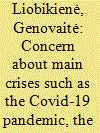

|
|
|
|
|
| Summary/Abstract |
The number of crises experienced around the world forces people to reconsider and reassess various aspects of their lives. The energy crisis caused by the war in Ukraine and uncontrolled climate change revealed the importance of energy-saving behavior. Thus, the aim of this paper is to analyze the concerns about current crises such as the Covid-19 pandemic, the war in Ukraine, and climate change's impact on energy-saving behavior and changes in environmental concern. Referring to the survey conducted in Lithuania in 2022, where 1000 respondents participated, the results revealed that the war in Ukraine was the most concerning problem. The level of climate change concern was slightly lower. Meanwhile, the Covid-19 pandemic was the least important problem in Lithuania in 2022. Furthermore, respondents stated that the Covid-19 pandemic contributed to the changes in environmental concern and energy-saving actions more than the war in Ukraine did. Meanwhile, the Generalized Linear Model results revealed that only the war in Ukraine positively and significantly influenced energy-saving behavior. The Covid-19 pandemic concern negatively affected energy-saving behavior, while the climate change concern factor affected it indirectly, as the interaction of attitudes toward energy consumption. Thus, this study revealed the main aspect of and how to encourage energy-saving behavior in the context of the main current crises.
|
|
|
|
|
|
|
|
|
|
|
|
|
|
|
|
| 11 |
ID:
173969


|
|
|
|
|
| Summary/Abstract |
In this article, we discuss the relationship between formal education and public support for a culture of peace, defined here as values and attitudes related to key aspects of peace, such as tolerance, respect and non-violence. For that, we analyzed individual and country-level data from the World Values Survey (WVS) arguing that such data provides relevant evidence to the field of peace studies, and can contribute to explore complex relationships between education and outcomes that are difficult to measure cross-culturally, such as attitudes towards peace. We constructed an index to measure attitudes towards positive peace using WVS items, which reveals significant disparities between countries. We then explored the relationship between this variable and levels of formal education at individual and national levels. We found considerable differences in countries’ levels of tolerance and respect as well as aversion to violence, which is related to education attainment in almost all countries analyzed.
|
|
|
|
|
|
|
|
|
|
|
|
|
|
|
|
| 12 |
ID:
093687
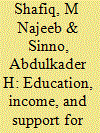

|
|
|
|
|
| Publication |
2010.
|
| Summary/Abstract |
The authors examine the effect of educational attainment and income on support for suicide bombing among Muslim publics in six predominantly Muslim countries that have experienced suicide bombings: Indonesia, Jordan, Lebanon, Morocco, Pakistan, and Turkey. The authors make two contributions. First, they present a conceptual model, which has been lacking in the literature. Second, they consider attitudes toward two different targets of suicide bombings: civilians within the respondent's country and Western military and political personnel in Iraq. The authors find that the effect of educational attainment and income on support for suicide bombings varies across countries and targets.The findings therefore draw attention to the difficulties of making generalizations about Muslim countries and the importance of distinguishing between targets of suicide bombings.
|
|
|
|
|
|
|
|
|
|
|
|
|
|
|
|
| 13 |
ID:
171196
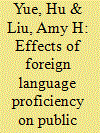

|
|
|
|
|
| Summary/Abstract |
What explains public attitudes towards a former aggressor state? Conventional wisdom would suggest the prevalence of negative sentiments rooted in historical hatred. In this article we contend that when individuals are proficient in a foreign language—e.g. a lingua franca—they have an alternative channel through which they are exposed to positive narratives put forth by other parties regarding the former aggressor state. And as a result, their attitudes towards the former aggressor state are more positive than those held by their linguistically limited counterparts. To test our argument, we focus on public attitudes towards the Japanese in Mainland China, Singapore, and Taiwan—three Chinese-ethnic majority political units that experienced Japanese aggression leading up to and during World War II. Using survey data, we demonstrate that individuals who are proficient in the English language are much more likely to hold positive attitudes of the Japanese. These results are robust even when we consider whether some individuals are predisposed to being cosmopolitan; whether some individuals have more opportunities to learn English; and whether the linguistic effects are symptomatic of American soft power.
|
|
|
|
|
|
|
|
|
|
|
|
|
|
|
|
| 14 |
ID:
123281


|
|
|
|
|
| Publication |
2013.
|
| Summary/Abstract |
The energy conservation behaviour of people is a significant issue given the growing global concern about environmental issues. The current study is part of a larger intervention project aimed at changing the energy use behaviour of people living in rural households in Kerala, India. Preliminary activities of the project started in early 1997. The management and administration of the project spread over a period of 8 years. The study explores the extent of energy saved by these rural households when awareness, availability and training about the technologies are present, and thereby examines the impact of attitudinal variables and contextual factors on the energy-saving behaviour of people. This paper revisits the theories of behavioural change in the context of energy-saving behaviour and investigates whether Attitude, Behaviour, Context theory can be used to predict environmentally significant human behaviour. Findings revealed that traditional habits and beliefs influenced attitude formation in rural households and hence should be treated as an important consideration in changing energy conservation behaviours in the future.
|
|
|
|
|
|
|
|
|
|
|
|
|
|
|
|
| 15 |
ID:
166712


|
|
|
|
|
| Summary/Abstract |
Abundant research has focused on the public acceptance of renewable energy sources (RES) since their successful implementation is often dependent on the public. Yet, little is known about the attitudes of university students towards RES whose study field is related to the environment, even though the mindset of these students is considered relevant since they are possible experts in the RES field. To contribute to this neglected research strand, this paper aims to explore the awareness about and attitudes towards RES of students majoring in the Department of Forestry and Management of the Environment and Natural Resources at the Democritus University of Thrace in Greece. Results based on quantitative data collected via questionnaire show that the surveyed students support renewables and have awareness about the current polluting energy system. Moreover, they have positive environmental attitudes and fully recognize the need for energy transition. Finally, there are significant differences among students from different years of study, highlighting that fourth- and fifth-year students take greater interest in working in the RES sector after they complete their studies.
|
|
|
|
|
|
|
|
|
|
|
|
|
|
|
|
| 16 |
ID:
149899


|
|
|
|
|
| Summary/Abstract |
The development of shale gas in the United Kingdom (UK) using hydraulic fracturing, more commonly known as ‘fracking’, remains in its infancy. Yet understanding public attitudes for this fledgling industry is important for future policy considerations, decision-making and for industry stakeholders. This study uses data collected from the University of Nottingham, UK nationwide online survey (n=3823) conducted in September 2014, to consider ten hypothesises about the UK public's attitudes towards shale gas. From the survey data we can see that 43.11% of respondents support shale gas extraction in the UK. Furthermore, our results show that women, class DE respondents, non-Conservative party supporters, and respondents who positively associate shale gas with water contamination or earthquakes are less likely to support the extraction of shale gas in the UK. We also discuss potential policy implications for the UK government arising from these findings.
|
|
|
|
|
|
|
|
|
|
|
|
|
|
|
|
| 17 |
ID:
175472


|
|
|
|
|
| Summary/Abstract |
Israel is often at the centre of debate regarding religious diversity. We examined how exposure to religious symbols is associated with intergroup anxiety perceived from the Jewish majority among Arab minority groups. We found that outgroup and ingroup priming had different consequences for the two Arab groups: when primed with outgroup Jewish concepts, Arab-Muslim persons reported higher intergroup anxiety than Arab-Christian participants. However, when primed with ingroup concepts, the two minority groups did not differ significantly in intergroup anxiety experienced in interactions with Jews. Our results convey the importance of investigating why and when religious diversity may have a negative impact on intergroup relations.
|
|
|
|
|
|
|
|
|
|
|
|
|
|
|
|
| 18 |
ID:
166619


|
|
|
|
|
| Summary/Abstract |
Existing studies have fixated on the macroeconomic implications of Chinese engagements with Africa with relatively less attention to micro-level exchanges and the attendant social consequences. This paper captures the nuances of everyday dispositions and attitudes of Ghanaian traders toward Chinese entrepreneurial migrants relative to ‘older and larger’ immigrant trading groups (notably Indians, Lebanese and Nigerians). The study elicited data from local traders and key informants from trade unions, public institutions and academia. The findings indicate that Chinese merchants often had ‘aggressive’ and ‘overly competitive’ business style compared to other migrants and indigenes. Accordingly, several seemingly unresolvable underlying tensions ensued between the Chinese and other traders. It was evident that contextual elements such as trust and sense of fairness shaped the attitudes and degree of cordiality between the trading groups. Going forward, it will be prudent to focus not only on the legal and political ramifications of Chinese migratory flows but also develop measures to integrate the Chinese in African environment socially.
|
|
|
|
|
|
|
|
|
|
|
|
|
|
|
|
| 19 |
ID:
073387


|
|
|
|
|
| Publication |
2006.
|
| Summary/Abstract |
The Arab-Israeli conflict has provided fertile ground for stereotypes, prejudices, and antagonistic dialogue between the two sides. This hostile atmosphere led to a lack of public and academic interest in Israeli culture on the part of Arab intellectuals until the late 1960s. The military defeat in the 1967 war persuaded various elements in the Arab world, particularly Egyptian and Palestinian, to invest a good deal of effort into gaining knowledge of the Israeli 'Other'. Research and translation activity on the subject of Israeli culture has broadened and improved over the years, but it is trapped between two conflicting attitudes to this culture. Scholars and translators close to nationalistic, leftist, and fundamentalist circles adopted an extreme antagonistic attitude, which emphasized the view of 'the Other' as alien and threatening; this standpoint encouraged tendentious methods of research and translation which supported and strengthened it. As against this, other scholars and translators adopted a liberal and pragmatic attitude, which did not negate fruitful dialogue with 'the Other'. This attitude encouraged more objective research and translation, which placed emphasis on the aesthetic and literary value of the translated texts.
|
|
|
|
|
|
|
|
|
|
|
|
|
|
|
|
| 20 |
ID:
092771
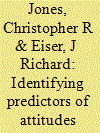

|
|
|
|
|
| Publication |
2009.
|
| Summary/Abstract |
The threats posed by climate change are placing governments under increasing pressure to meet electricity demand from low-carbon sources. In many countries, including the UK, legislation is in place to ensure the continued expansion of renewable energy capacity. Onshore wind turbines are expected to play a key role in achieving these aims. However, despite high levels of public support for onshore wind development in principle, specific projects often experience local opposition. Traditionally this difference in general and specific attitudes has been attributed to NIMBYism (not in my back yard), but evidence is increasingly calling this assumption into question. This study used multiple regression analysis to identify what factors might predict attitudes towards mooted wind development in Sheffield, England. We report on the attitudes of two groups; one group (target) living close to four sites earmarked for development and an unaffected comparison group (comparison). We found little evidence of NIMBYism amongst members of the target group; instead, differences between general and specific attitudes appeared attributable to uncertainty regarding the proposals. The results are discussed with respect to literature highlighting the importance of early, continued and responsive community involvement in combating local opposition and facilitating the deployment of onshore wind turbines.
|
|
|
|
|
|
|
|
|
|
|
|
|
|
|
|
|
|
|
|
|